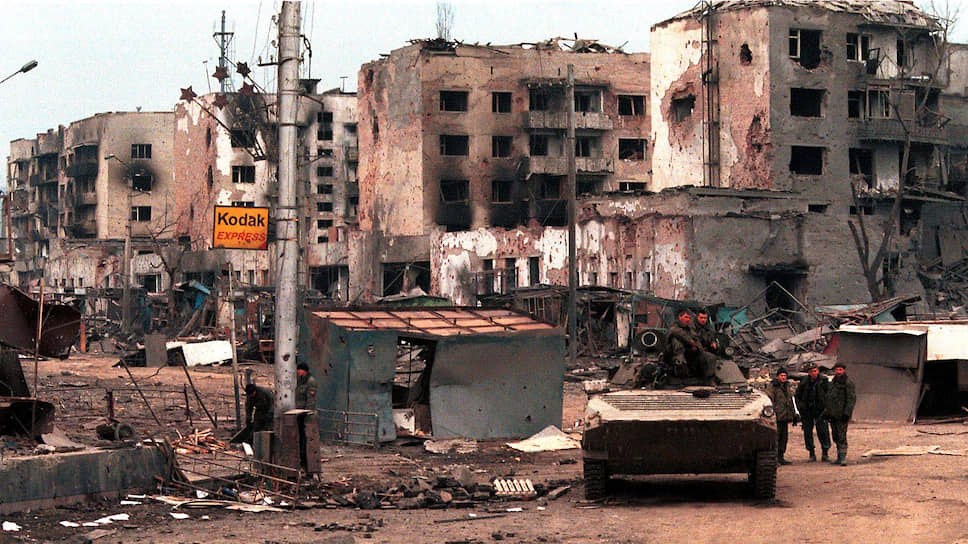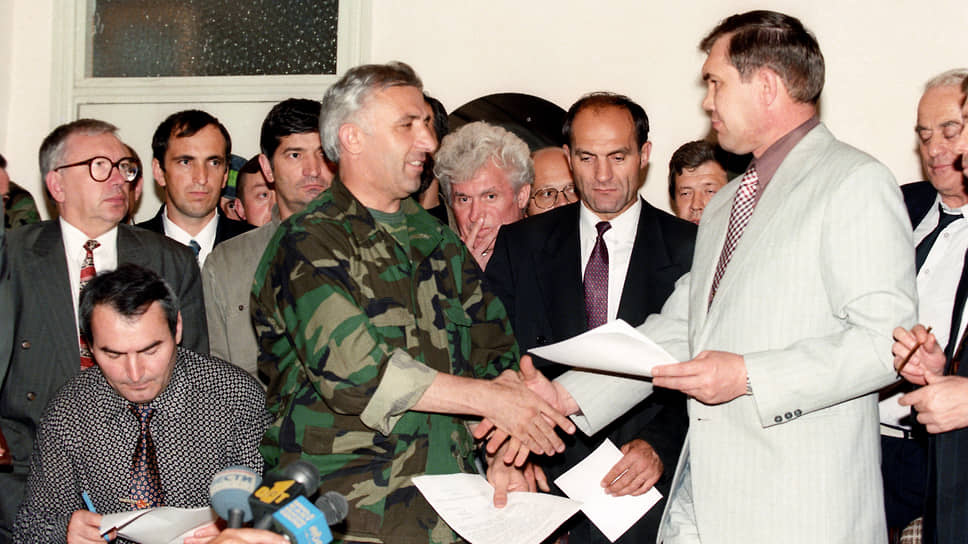“Chechnya starts from Khasavyurt and ends at Vladikavkaz”
[ad_1]
On January 9, 1993, the Chechen-Ingush Autonomous Soviet Socialist Republic (ChIASSR) officially ceased to exist. Chechnya declared its independence, while Ingushetia remained part of Russia as a subject of the federation. This divorce led to dramatic events. Especially in Chechnya, which went through two devastating wars.
“Enough, time to go”
On a summer day in 1993, in the former office of the first secretary of the Chechen-Ingush regional committee of the CPSU in Grozny, two generals, Dzhokhar Dudayev and Ruslan Aushev, were talking in a friendly, one might even say, brotherly manner.
The latter was in the ceremonial general’s tunic, on which the Golden Star of the Hero of the Soviet Union sparkled. Ruslan Aushev, who by that time had been in charge of the new subject of the Russian Federation, the Republic of Ingushetia, for the second year, liked to wear a military uniform. At work, he put on a field uniform, and went to visit in the front door. The next time I saw the Ingush president in a smart general’s tunic in Grozny was in January 1997 at the inauguration of Aslan Maskhadov, president of Ichkeria.
Dzhokhar Dudayev was in an elegant double-breasted suit, white shirt and a tie with a small knot, as he liked. He also liked to wear wide-brimmed black hats, long leather coats and sunglasses. In such attire, he looked like an Italian mafia. Especially when surrounded by their tough guards who dressed up to imitate the boss.
The President of Ichkeria did not part with his general uniform, carefully kept it right there in the presidential office, putting it on on various solemn occasions. In the fall of 1991, after being elected president of Ichkeria, Dzhokhar Dudayev spoke in front of his many fans with an inaugural speech in the form of a general of the Soviet army.
With General Aushev, General Dudayev spoke like a mentor. Maybe because he was older, maybe because he felt the superiority of the leader of an independent, as he believed, state over the leader of a small, newly formed subject of Russia. Sometimes he got up from the table and began to walk around his spacious office, continuing to talk.
“Hallas (translated from Arabic – “enough.”— “b”), for centuries we have been under oppression, it’s time to leave, ”Dudaev said clearly, in a military way, as if giving an order to a subordinate.
It was not entirely clear whether this was advice to the Ingush, or a commentary on what he and his supporters had done by declaring independence from Russia. One way or another, it was obvious that the Ichkerian leaders wanted their example to be followed in other North Caucasian republics.
Aushev did not argue with Dudayev, he silently and patiently listened. The Ingush leader was in Grozny not on an idle visit. On January 9, 1993, the Law on Amendments to the Russian Constitution came into force, according to which the former Checheno-Ingushetia was divided into two subjects – Chechnya and Ingushetia. The leaders of the rebellious Ichkeria ignored this law and declared independence.
“The Chechen people have declared independence, and I respect this choice,” General Aushev said, “but the Ingush are with Russia, and we need to agree on the border between the republics.”
It was not possible to reach an agreement. As a result of the negotiations, it was announced that there would be no border between the fraternal peoples.
When Ruslan Aushev, during his presidency and after, was asked where the border between Ingushetia and Chechnya was, he laughed it off: “Ingushetia begins from Vladikavkaz and ends at Khasavyurt, and Chechnya begins from Khasavyurt and ends at Vladikavkaz.”
The administrative border between Chechnya and Ingushetia was officially drawn only in October 2018.
The people can’t wait
About the fact that the “Chechen people” declared independence, Ruslan Aushev, of course, was cunning. On August 19, 1991, when the GKChP happened in Moscow, Dzhokhar Dudayev, then the head of the executive committee of the National Congress of the Chechen People, went into the office of the chairman of the then Chechen-Ingush TV and Radio Committee and demanded to give him air. “I want to appeal to my people, they are confused, they don’t know what to do,” he explained.
The general loved the expression “my people” and used it even when talking to a Chechen. Once I came to see him as the editor-in-chief of the Groznensky Rabochiy newspaper with a request for some kind of preference for the newspaper. After listening carefully to me, he banged his tightly clenched fists on the table and said in a precise voice: “What can your newspaper do for my small and proud people?”
“Maybe for our people,” I said, hinting that I was also a Chechen.
“Well then, for our people,” the general agreed.
In August 1991, Dudayev was not allowed to see the people, refusing to broadcast. Two weeks after that, the Dudayevites dispersed the Supreme Council of the Chechen-Ingush Autonomous Soviet Socialist Republic and declared the de facto independence of Chechnya.
Ruslan Khasbulatov, Chairman of the Russian Supreme Council, who arrived in Grozny, tried to save the situation. He met with a part of the parliament of the Chechen-Ingush Autonomous Soviet Socialist Republic dispersed by the Dudayevites, formed a group of deputies from them, which was supposed to exercise power in the transition period until the new elections of the republic’s authorities.
“Dzhokhar accepted this plan, gave me his word that he would stick to it, and as soon as I left, he acted in his own way, vilely deceiving me,” Mr. Khasbulatov later lamented.
By the end of 1991, Dzhokhar Dudayev, already elected president of Ichkeria, will by his decree recall the deputies of the USSR and the RSFSR elected from Chechnya, including Ruslan Khasbulatov, from Moscow.
At the same time, the constitution of the Republic of Ichkeria came into force, in which it was recognized as “a sovereign and independent democratic legal state created as a result of the self-determination of the Chechen people.”
The permanent parliament was declared the supreme body of legislative power, and the executive power (cabinet of ministers) was headed by the president. Islam was proclaimed the state religion.
The Ichkerian leaders were in such a hurry to document independence that things sometimes came to the point of curiosities. I remember that at the end of October 1991, Elza Sheripova, the Prosecutor General of Ichkeria, which had declared independence, came to the editorial office of the Groznensky Rabochiy newspaper and put the text of the basic law on the table for me (I was the deputy editor-in-chief): “Publish!”
The typewritten text was full of typos. In some paragraphs, “Chechnya” was replaced by “Sudan” or the names of the Baltic republics: the document was hastily compiled from the constitutions of these countries. “This is nothing,” the attorney general said, correcting her mistakes. “We need to fix sovereignty as soon as possible. The people are tired, they can’t wait.”
Moscow does not want to wait
The overthrow of the power of Chechen-Ingushetia was not without bloodshed. In the summer of 1991, radical activists broke into the session of the Supreme Council of the republic in order to declare the parliament illegitimate. Hearing the screams of those who broke into the building, the deputy and head of Grozny, Vitaly Kutsenko, began to get out into the street through a secret passage, but under the onslaught of his pursuers, he fell off the window of the second floor and crashed to death.
Or he was pushed. As it was in fact, no one began to find out.
A lot of blood was shed two years later, when Dudayev’s opponents nevertheless decided to hold a referendum to find out whether the Chechens want to secede from Russia or not.
It happened like this. At dawn on June 4, 1993, Dudayev’s militants, led by Shamil Basayev, surrounded the building of the Grozny city assembly. Inside were deputies who were preparing a referendum on independence, as well as policemen guarding them.
The deputies refused the Dudayevites’ ultimatum to issue ballots prepared for voting. A Gvozdika self-propelled artillery mount was driven up to the building. But even then the deputies did not accept the ultimatum.
The Gvozdika fired a blank, punching a huge hole in the wall. Policemen jumped out of the building, at whom aimed fire was opened from machine guns and machine guns. There were many dead and wounded – about two dozen people.
After this bloody attack, in order to avoid even greater casualties, opposition leaders disbanded the peaceful anti-Dudaev rally that had been going on for many days on Grozny’s Theater Square. A curious incident occurred at this rally.
In the midst of the action, quite unexpectedly, Dzhokhar Dudayev himself appeared on Theater Square. They say he wanted to address the audience, hoping to convince them to go over to his side. The general was sure that the majority of Chechens supported him, and he blamed “Russian provocateurs” for the mass protests.
They say that the general was dissuaded from visiting the Theater Square, but he was inexorable. “I must speak to my people,” he insisted.
According to eyewitnesses, an attempt to talk to the people almost ended in death for the general. He was only miraculously able to escape from the crowd attacking him.
The Dudayev regime then managed to resist and suppress the opposition. But not for long. Entire districts, such as Nadterechny and Urus-Martanovsky, began to come out of the subordination of official Grozny. Their inhabitants were overwhelmingly pro-Russian. The Dudaevites did not even dare to show themselves there.
The situation for the Ichkerian authorities became completely threatening when, in the spring of 1994, ex-chairman of the Supreme Council of Russia Ruslan Khasbulatov, who was released from Lefortovo, appeared in the republic. Even field commanders who were once devoted to General Dudayev went over to him. Everything went to the fact that the power in Grozny could be replaced without bloodshed. The republic would return to the legal field of Russia. And it would have happened under the leadership of Ruslan Khasbulatov, whose popularity in Chechnya grew every day.
But this frightened not only Dzhokhar Dudayev and his supporters, but also the then inhabitants of the Kremlin, who did not want the former chairman of the Supreme Council to return to big politics. In Moscow, they decided to topple the Dudayev regime with the hands of the armed opposition. But this idea failed.
Then the federal authorities had to carry out a large-scale military operation in Chechnya. First one, and then another.
[ad_2]
Source link










